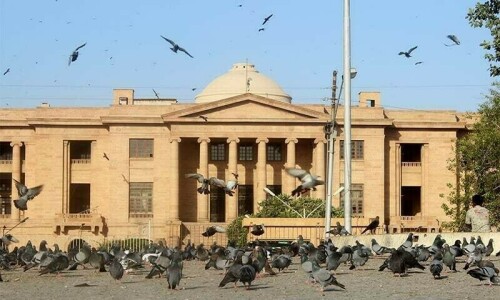LAHORE, May 2: The number of motorvehicles registered in the city has increased by 16.5 times since 1980 and has exceeded 1.17 million growing at an average of 3,300 per month for the past one year and four months.
More than a million registered vehicles use petrol as fuel, nearly 150,000 are run on diesel and only around 11,000 on gas.
The total number of vehicles registered in the city has increased from 70,342 on June 30, 1980 to over 1,160,000 by April 30 this year and is growing by over 100 vehicles daily.
The total number of vehicles increased from 70,342 on June 30, 1980 to 238,143 on June 30, 1989 growing at a rate of 11.3 per cent per annum. The number surged to 618,566 on June 30, 1999 increasing by an average 10 per cent annually.
Of 1.17 million vehicles registered in the city, over half a million are motorcycles followed by cars whose number is in excess of 300,000. The number of registered rickshaws is in excess of 40,000 and delivery vans and buses in excess of 23,000 and 20,000 respectively. The number of taxis and trucks exceeds 10,000 each. The increase in number of delivery vans has been the highest during the past three and a half decades. The number increased from 653 on June 30, 1980 to over 225,000 or more than 30 times. Increase in cars has been the next highest during the past three and a half decades. The number has increased by over 17,000 on June 30, 1980 to over 300,000 or nearly 18 times by now.
The number of motorcycles increased from 36,142 on June 30, 1988 to over half a million or around 14 times. The number of rickshaws has increased from 7,597 on June 30,1980 to over 40,000 or nearly six times. The number of buses increased from 2,327 on June 30, 1988 to over 20,000 or over 8.5 times by now. LCCI team: A Lahore Chamber of Commerce and Industry delegation led by Senior Vice-President Sohail Lashari returned from Tajikistan on Monday.
Talking to journalists, Mr Lashari said agreements had been signed on the conclusion of the three-day ‘Made in Pakistan’ exhibition of products of 38 local companies, which was visited by a large number of people from Uzbeksitan, Tajikistan and Kyrgyzystan.
He said the agreements had been signed for supply of steel billet, raw wool, raw silk, raw leather, home appliances, paints and garments. Joint venture agreements had been signed for water parks, steel furnaces, paint and electrical cable factories and plastic pipes.
Agreements for export of Pakistan-assembled computers, garments, Basmati rice, sports goods, pharmaceutical products, cutlery, television sets, DVDs, can packaging, motorcycles, plastic packaging, labels, mango pulp and plastic pipes had also been signed, he said.
He said Pakistan and Tajikistan would share their expertise in textile sector. Tajikistan could export oil-seeds, aluminium, raw cotton and semi-finished goods to Pakistan and could be helped in developing its aluminium industry, he added.












































Dear visitor, the comments section is undergoing an overhaul and will return soon.